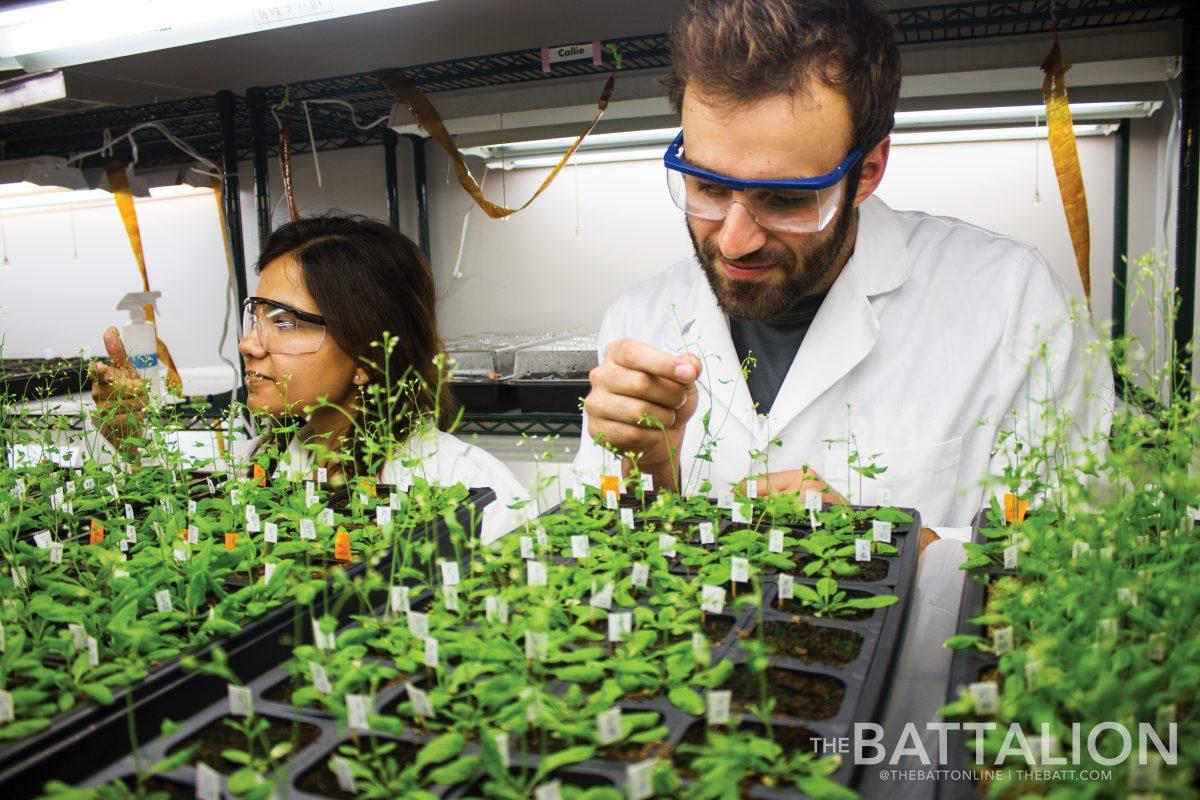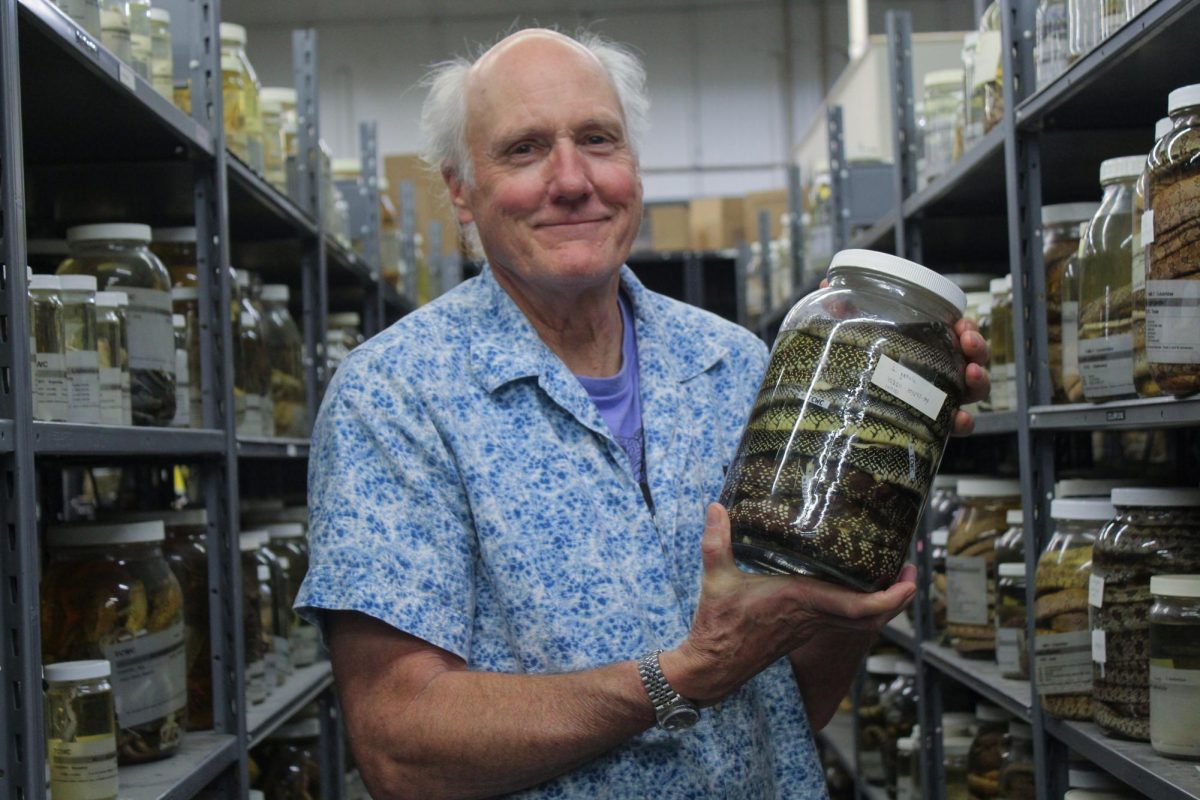While the interim period at Texas A&M can seem quiet, graduate students say they are excited to begin a productive, undistracted summer.
The Shippen group in the Department of Biochemistry and Biophysics is studying telomere biology, an area of study related to a repetitive region of nucleotides at the end of a chromosome which serves as a mechanism for protection. The group is specifically interested in the telomere biology of a plant species, Arabidopsis thaliana. Callie Kobayashi, a seventh year graduate student in the lab explained the benefits of using a plant as a model organism.
“There are some things in plant telomere biology that are more similar to humans than yeast,” Kobayashi said. “But the biggest thing is that a lot of the time in yeast and human cells that when you make a mutation its lethal. So if it can’t survive a mutation then we can’t characterize what that particular gene or protein is responsible for doing. But with plants you can make all sorts of mutations and it still can grow. So we can really characterize how that mutation affects telomere biology.”
Kobayashi explained plants are more resilient to changes in their genome due to the fact that they cannot move. This has caused them to develop systems to adapt to stressful situations. Sreyashree Bose, a fourth year graduate student in the lab, studies a long non-coding RNA which appears to be involved in mitigating DNA damage. She said this long non-coding RNA is similar to one found in humans which is important in maintaining telomere length, but this new non-coding RNA has some strange behaviors.
“It is actually not involved in acting as a subunit of the telomerase, but what we think it is doing is that it is acting as a regulator of the telomerase instead,” Bose said.
Bose explained that telomerase is an enzyme responsible for the maintenance of telomeres. This enzyme needs a subunit to operate, which is a more canonically behaving long non-coding RNA; however, the long non-coding RNA she studies appears to regulate the activity of the enzyme instead. Bose explained the reason that regulation of telomerase is necessary.
“Our DNA is under constant stress and especially plants’ DNA it’s under constant stress,” Bose explained. “Whenever a damage is created the type of structure that is generated at the damage site is very similar to the structure present at the telomeric end. So the telomerase might get confused and think that this is where the telomeric repeat needs to begin. So that’s why we need some component which is going to regulate the activity of the telomerase enzyme under such conditions.”
Bose said she is interested in the movement of these long non-coding RNA upon the occurrence of DNA damage in a cell. A typical experiment performed by Bose allows her to locate the position of the long non-coding RNA of interest and include techniques such as cell extraction and fluorescence microscopy, allowing her to visualize where the long-coding RNA is localized. For example, she said, it could be present in the nucleus or the cytoplasm of the cell.
Borja Barbero, a third year student in the group, said he is also interested in DNA damage and the machinery necessary to protect a cell. He studies POT1B, a unique protein in Arabidopsis thaliana which appears to be important in protecting cells from DNA damage.
“We found out that POT1B is highly expressed in tissues that naturally occur DNA damage such as seeds,” Barbero said. “A dry seed is basically like a bear, hibernating, basically sleeping and waiting for the conditions to grow and you don’t want the bear to be damaged. POT1B is highly expressed under those conditions basically when the seed is hibernating and waiting for the conditions to appear. We believe that is to protect the DNA from being damaged.”
The researchers offered advice for undergraduate students who are interested in obtaining graduate degrees.
“You have to want to go to graduate school,” Kobayashi said. “You need to be committed and really want to do a Ph.D. It’s difficult and you need that mentality. I think people need to know how intense and difficult it can be.”
Bose discussed the independence that graduate students need to develop.
“Graduate school comes with a level of uncertainty, first off,” said Bose. “Nobody is going to hold your hands. You will have to start developing critical analysis on your own in order to be successful. Graduate school is your own journey.”
Studying stressed out plants in the low stress summer
May 29, 2018
Photo by Photo by Meredith Seaver
Graduate student Borja Barbero said the research team discovered a unique trait that prevents DNA from being damaged.
0
Donate to The Battalion
$2790
$5000
Contributed
Our Goal
Your donation will support the student journalists of Texas A&M University - College Station. Your contribution will allow us to purchase equipment and cover our annual website hosting costs, in addition to paying freelance staffers for their work, travel costs for coverage and more!
More to Discover










